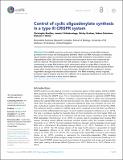Control of cyclic oligoadenylate synthesis in a type III CRISPR system
View/
Date
19/07/2018Author
Grant ID
BB/M021017/1
BB/M000400/1
CH160014
Keywords
Metadata
Show full item recordAbstract
The CRISPR system for prokaryotic adaptive immunity provides RNA-mediated protection from viruses and mobile genetic elements. When viral RNA transcripts are detected, type III systems adopt an activated state that licenses DNA interference and synthesis of cyclic oligoadenylate (cOA). cOA activates nucleases and transcription factors that orchestrate the antiviral response. We demonstrate that cOA synthesis is subject to tight temporal control, commencing on target RNA binding, and is deactivated rapidly as target RNA is cleaved and dissociates. Mismatches in the target RNA are well tolerated and still activate the cyclase domain, except when located close to the 3' end of the target. Phosphorothioate modification reduces target RNA cleavage and stimulates cOA production. The 'RNA shredding' activity originally ascribed to type III systems may thus be a reflection of an exquisite mechanism for control of the Cas10 subunit, rather than a direct antiviral defence.
Citation
Rouillon , C , Athukoralage , J S , Graham , S , Grüschow , S & White , M F 2018 , ' Control of cyclic oligoadenylate synthesis in a type III CRISPR system ' , eLife , vol. 7 , e36734 . https://doi.org/10.7554/eLife.36734
Publication
eLife
Status
Peer reviewed
ISSN
2050-084XType
Journal article
Description
This work was supported by a grant from the Biotechnology and Biological Sciences Research Council (REF: BB/M000400 /1 to MFW), and a Royal Society Challenge Grant (REF: CH160014 to MFW).Collections
Items in the St Andrews Research Repository are protected by copyright, with all rights reserved, unless otherwise indicated.

